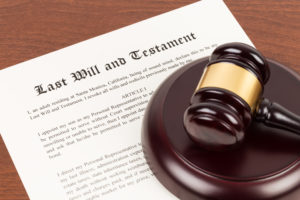Any estate planning checklist should include the creation of a valid Will. The following article is taken from the perspective of an estate planning attorney and the various objections he encounters from individuals who do not see the need for a will.
Definition of a Will: A Will is a legal document, executed in accordance with certain formal requirements of State law, that appoints a personal representative who will handle your estate when you die, and which determines who receives what from your estate.
[Alternatively, many people choose to have a properly funded living trust created, with a pour-over will acting as a catch-all to bring all assets under the umbrella of the living trust. Either way, a will is an integral part of estate planning.]Why You Need a Will
People tell me they don’t need a Last Will and Testament because their surviving spouse will get everything anyway.
Wrong! Check your local state laws and you will discover that surviving spouses generally are entitled to between half and a third of their deceased spouse’s estate.
(In other words, your spouse is not guaranteed to receive your entire share of the estate when you die. Without a Will, your state’s law of intestacy will determine how your share of the estate is distributed).
People tell me that all their property is in joint tenancy, so their surviving spouse gets everything at their death.
Is this a good idea?
Will your surviving spouse be able to manage these assets alone?
Will they rely upon unreliable advisors?
What happens when they remarry? Your children may find themselves without an inheritance.
People tell me that their spouse will administer their estate after their death, so they don’t need to name an administrator in a Will.
Do you really want your grieving widow/widower to have to suddenly handle these additional financial affairs while putting their lives together after your death?
Are they the best person to handle an estate accounting and administration?
Will they be able to say “no” if they have to?
People tell me that their spouse will take care of the children after they die. Wonderful, but what if you and your spouse die suddenly, in an accident for example? It happens.
Your Will can:
- Inform the Court who you want to raise your children (by designating a guardian);
- Inform the Court who is to take care of your financial assets until the children are of a responsible age, which is not necessarily the same person who is raising them (often the child’s guardian and executor of your will are a different person);
- Place assets in trust to delay the time at which the children receive their inheritances, because otherwise the children will receive everything with no strings attached at age 18! (Unless your children have a solid financial education, giving them a full inheritance at age 18 is a recipe for disaster).
People tell me that they do not have enough assets to be worth fighting over.
Do you have a family photo album?
Grandma’s hope chest?
An old watch?
I have seen families literally torn apart over each of these items.
You owe it to your family to make the decisions from the grave. Your advanced planning may avoid petty fights which could otherwise tear the family apart after your death.
People tell me how they want to protect their families in case they die. This is what I love about being an estate planner; helping people protect their loved ones even after they pass away. This is what a Will can do for you and for your family.
Eric S. Ratliff, JD, LLM
Ratliff Law Firm
740 Pollard Road
Kodak, TN 37764
(865) 932-3441 x704
eratliff@ratlifflawfirm.com





